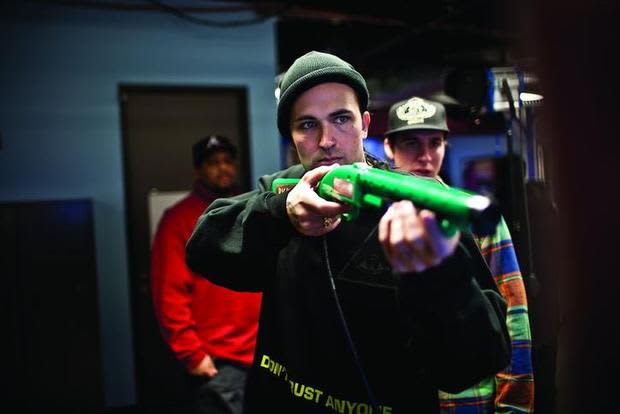Yelawolf’s mother was fifteen when he was born. That’s her in his “Pop the Trunk” video, holding a hatchet, chopping “early morning hog” in her Gadsden, Alabama home. He raps sitting in the backseat of a Chevy pleading with you to not force his hand into having you cut up with a machete or shot with a gun “as tall as the midget Willow.” Lit bleakly, Yelawolf looks, if not particularly tough, rather menacing in the video, his hair shaved on one side and slicked over wet and long across the top of his head, large chest and neck tattoos poking out of his shirt. After describing a gruesome murder with a rock salt shotgun shell, he ends his verse saying This ain’t a figment of my imagination/ Buddy this is where I live/ ’BAMA!. He does not, at any point in the song, sound happy. But Yelawolf still lives in Gadsden. “I got a house in Walnut Park which is like this Gummo-ass neighborhood,” he says, with a combination of bummer acceptance and pride. “You’re going to see dead deer on people’s hoods and rebel flags. In those same trucks, you’re going to hear Project Pat and Waka Flocka.” If he’s not talking about his own truck, he might as well be.
At 26, after years fiddling around in the studio and on stage with a full countryish band (he occasionally goes by “Catfish Billy”), Yelawolf finally released a proper mixtape, Trunk Muzik, and the discerning community of rap fans and critics responded fervently. “We stepped back and did this rap project, and it’s really getting all the attention in the world,” he says, stupefied. Yelawolf wants to be famous, at one point referencing a desire “to be doing what Kid Rock is doing, with my take on it.” But far from the mass appeal of rap-rock, Trunk Muzik is a showcase for his distinctly Southern, hard staccato flow and lucid storytelling. “Not to be corny, but I really want to make history, especially for my state, Alabama,” he says, kicking the skateboard at his feet. “I’m doing it for small towns all across America, and, you know, all over the world. I’m doing it for under-represented people—blue collar, working class people who live in obscure places, who support music but never really get a chance to shine because their cities don’t have an outlet. I represent country people, I represent skateboarders, I represent B-boys, I represent classic rock.” He sounds like a politician giving his stump speech, damping national aspirations with rootsy folktales—his failed career as a pro skater, his time spent on a fishing boat, as a lawnmower, a brick mason, a construction worker. It’s in these roots, in this American microcosmic land where the great divisor and uniter in the melting pot is no longer race but class, where hip-hop is canonized pop music, that Yelawolf has found his constituency. And he knows it.
Stream: Yelawolf, Trunk Muzik 0-60
